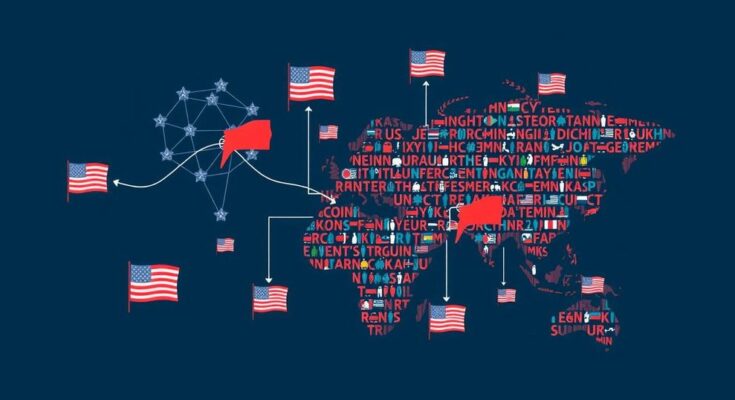The upcoming U.S. presidential election holds monumental implications for global dynamics, particularly regarding foreign relations, trade policies, and climate change. Candidates Kamala Harris and Donald Trump represent contrasting approaches that could lead to different geopolitical outcomes, affecting nations such as Israel, Russia, China, Europe, and Mexico, as well as broader climate initiatives.
The global ramifications of the upcoming United States presidential election resonate far beyond American borders, influencing international geopolitical dynamics, economic policies, and global security issues. This election, crucially different in its potential outcomes, could see Vice President Kamala Harris or former President Donald Trump rise to power, each representing distinct foreign policies that will substantially impact global affairs. In Israel, public sentiment leans favorably towards Mr. Trump, particularly due to his understanding of Israeli governmental stance on the Palestinian conflict. Nevertheless, a Harris administration may foster opportunities for diplomatic negotiations despite certain predictability in military support for Israel. Conversely, the election bears significant implications for Russia and Ukraine. President Trump’s statements suggesting Ukrainian accountability for Russian invasion create concerns regarding a possible expedited peace agreement that could favor Moscow. In contrast, a Harris presidency may likely uphold robust support to Ukraine, which many Ukrainians eagerly anticipate. China views both contenders as hawkish, yet their internal perspectives diverge; Trump’s tariffs could harm China’s economy, while his less aggressive approach to the region can mitigate perceived threats against Taiwan. For Europe, the outcome could signal a historic pivot. Many Europeans remain anxious about reinstated tariffs under Trump and the possibility of NATO’s frailty, while a Harris administration might encounter hesitance to engage fully in European security matters, urging allies to bolster their defense independence. In the realm of global trade, the election serves as a referendum on the very structure of international economic agreements. President Trump invites the prospect of escalating tariffs to unprecedented levels, while Vice President Harris’s approach hints at a more calibrated stance that balances competitiveness and international relations. Africa’s response to either candidate divides afresh, where Trump is sometimes viewed as a reflection of authoritarian leadership styles, whereas Harris embodies potential closeness to the continent due to her heritage and past connections. Mexico stands to endure significant strain irrespective of who prevails, with heightened immigration challenges and trade tensions looming large. Both candidates signal a restrictive migration policy with expansive ramifications for the region. Last but not least, climate policies hang in the balance, with Harris favoring renewable energy transitions while Trump may dilute existing emissions regulations, causing even faster climate degradation. The global impact of United States emissions policy cannot be understated. In essence, the leadership choice in this presidential election will profoundly influence the world’s socio-economic and political fabric, determining not only the trajectory of American foreign policy but also the responses from other global players navigating an increasingly intertwined international landscape.
As the United States approaches a pivotal election, the outcome carries significant global implications. The decision between Vice President Kamala Harris and former President Donald Trump will not only shape American domestic policy but also dictate the course of international relations, trade dynamics, climate action, and security alliances in a world facing evolving challenges. Each candidate brings forth distinct ideological perspectives, and as foreign correspondents indicate, the global community is closely analyzing the stakes involved in this election, including its potential to either exacerbate or alleviate tensions internationally.
In conclusion, the U.S. presidential election emerges as a critical juncture for global relations, with each candidate poised to lead the country in vastly different directions. The ramifications extend to various geopolitical arenas, including Israeli-Palestinian relations, the Russia-Ukraine conflict, China trade dynamics, European security posture, and climate change policies. The international community recognizes that the decisions made within the confines of U.S. politics wield the capacity to influence global stability, economic conditions, and environmental health for years to come.
Original Source: www.nytimes.com




